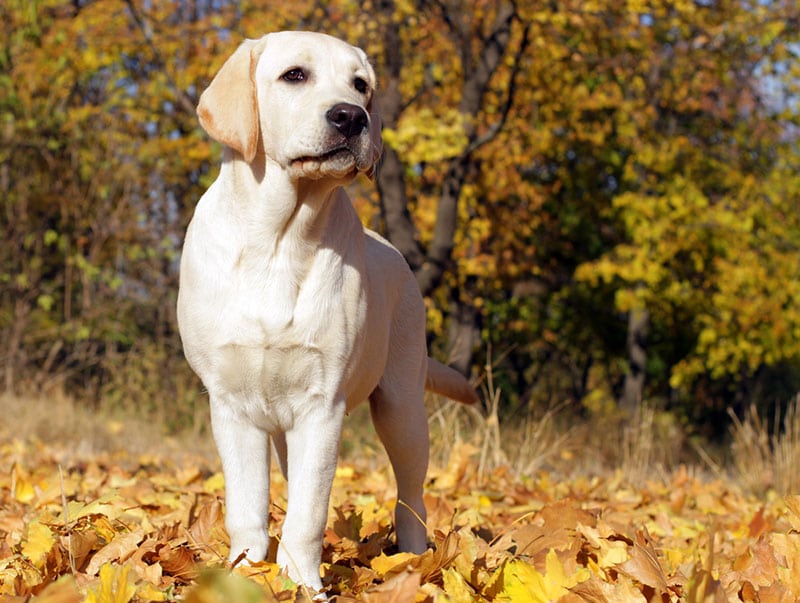What You Should Know About Kennel Cough

It’s fall. Besides the changing colors and cooler weather, kennel cough is another thing we expect to see more every fall.
What is Kennel Cough?
Kennel cough is more technically known as canine infectious tracheobronchitis. This term localizes the most common clinical sign, coughing, to the trachea (windpipe) and bronchi (within the lungs).It is an airborne pathogen that enters the nasal and oral passageways and reacts in the pharyngeal region. It may be caused by several viruses and bacteria that include:
- Virus: Bocavirus, Canine Adenovirus Type 2, Canine Corona Virus, Canine Distemper Virus, Canine Herpes Virus, Canine Influenza Parainfluenza, Pneumovirus, and Reovirus
- Bacteria: Bordetella Brochiseptica, Streptococcus Equi, Mycoplasma spp. and secondary bacterial infections.
The infection spreads rapidly from dog to dog in close quarters, such as a boarding kennel. This is the origin of its name.
My dog had the kennel cough shot but got sick anyhow. How come?
When we hear the term kennel cough, it is easy to assume the symptoms can all be laid at the doorstep of a single bug. In truth, kennel cough is caused by a mixed bag of virus and bacteria that can attack your pet singly or together. The stress associated with animals that are housed or grouped together enhances transmission of the disease. All dogs are susceptible but unvaccinated, immune compromised and young animals are most vulnerable.
If my dog gets infected what can I expect?
Kennel cough is often a mild, uncomplicated disease. Your dog may remain relatively healthy and energetic despite an ominous-sounding cough. Although coughing is usually mild, it may persist for several weeks. However, a more serious secondary infection can occur and cause other symptoms that include discharge from the eyes and nose, swollen tonsils, wheezing, lack of appetite and lethargy.
What things can a dog owner do to avoid infection?
Vaccinate. Most vaccination programs include a vaccine against the parainfluenza virus and Bordetella bronchiseptica. These should be administered to puppies and boostered in adults. Bordetella vaccination is performed either by injection, orally, or intranasally. The latter means that the vaccine is dropped into the nostrils. This permits immunity in the membranes of the nose and throat where the viruses and bacteria enter. Immunity after natural infection with respiratory viruses, like parainfluenza or bacteria like Bordetella, is neither solid nor long-lasting. Therefore, a booster just before placing your dog in a boarding kennel is good insurance against the disease. Most veterinarians recommend a Bordetella vaccine every six months if the dog frequents kennels, dog parks or doggie daycare facilities. Studies have shown that animals who are vaccinated against kennel cough will not become as sick, even when their cough is caused by multiple pathogens.
It’s a common comment heard in many veterinary hospital, “we don’t need the kennel cough vaccination. We never board or kennel our dog.” Despite this however, most people would be surprised to find out that this disease can be found in a wide variety of places. Please keep vaccinating. When there is an outbreak, try to limit exposure if possible. Maybe this isn’t the best time to go to the dog show or dog park. If your dog is infected keep your dog at home until 7 days after all symptoms are gone. Don’t spread disease. Infected dogs will spread viruses or bacteria through airborne particles where healthy dogs can inhale them. In some cases, the germs can also spread via toys or food dishes. Dogs that are exposed will generally show signs of illness within two to fourteen days and may act sick for an additional two weeks. In many cases, the disease is very mild and your pup may never run a fever or act as if anything is wrong. However, this is a disease that can progress to pneumonia and be life-threatening.
What are things I can do if my dog starts coughing?
Take your dog to the veterinarian as soon as possible. Your veterinarian may prescribe antibiotics, cough suppressants, bronchodilators, immune stimulating drugs and possibly steroids depending on symptoms. This will vary based on how sick your dog is and the individual practitioner. If your pet is dealing with any sort of cough, the best advice on treatment will come from your veterinarian. Although antibiotics may or may not be prescribed, your pet could receive a cough suppressant or even a recommendation to let the dog stand in the bathroom while you shower! Just like with kids, the warm, humid air in the bathroom can loosen congestion and help your pet to breathe more easily. Common sense measures include resting your pet, avoiding excitement, not using neck leashes and collars and limiting exercise.
Share This Post
Recent Posts
About Shallowford Animal Hospital
Shallowford Animal Hospital and The Pet Spa at Shallowford are dedicated to the exceptional, compassionate care your pet deserves. Pets hold a very special place in our families, and we treat yours like our own.



